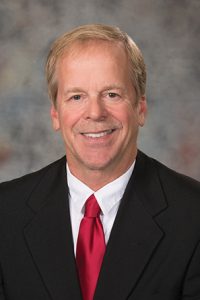Electronic keno retained, casino regulation bill advanced
A bill that would implement provisions of a constitutional gaming amendment approved in 2020 advanced from select file April 20.

Last November, Nebraska voters legalized all forms of games of chance at licensed horse racetracks through an initiative petition drive. LB561, as introduced by Sen. Tom Briese of Albion, would provide the regulatory framework necessary to implement that constitutional amendment.
Among other provisions, the bill would rename the State Racing Commission to the State Racing and Gaming Commission, raise the legal age to wager on horse racing from 19 to 21, allow wagering on sporting events at racetracks in the state, establish a process for allowing individuals to be excluded voluntarily from wagering, establish a system for filing complaints and classify manipulation of a game of chance or gaming machine as a Class I misdemeanor.
“I drafted this bill in an attempt to clarify what Nebraskans approved in November and to establish some reasonable parameters around this activity,” Briese said.
Lawmakers adopted an amendment during first-round debate that would allow individuals to play keno on an electronic ticket purchased at a licensed lottery operator using an app or debit card linked to a bank account. Currently, keno tickets must be purchased on a paper ticket with cash.
The provision was intended to lessen the impact of casino gaming on the state’s keno industry.
Briese offered an amendment during select file debate that would remove that provision from LB561.
The General Affairs Committee held a hearing on the keno provision during which, Briese said, testifiers could not demonstrate that allowing Nebraskans to play keno virtually would benefit the industry. He also said some Nebraskans believe that allowing virtual keno would expand gaming beyond what voters intended.
“Out of respect for that perception, and the lack of verifiable data that this will help the industry, I decided to pull the keno portion,” he said.
Sen. John Cavanaugh of Omaha said he opposed the amendment because regulation is needed to prevent municipalities from losing keno revenue, which is earmarked for community betterment projects.
“Keno is going to lose revenue, there’s no question about that, the question is how much?” Cavanaugh said. “If we do not help those [cities] weather the storm of this expanded gambling, then they’re going to lose the necessary revenue and they’re going to have to find it some place else.”
The amendment, which needed 25 votes to be adopted, failed 22-11.
Briese introduced a second amendment, adopted 39-0, that would require rulemaking to be conducted under the Administrative Procedures Act rather than by the Nebraska Racing and Gaming Commission.
The amendment also would prohibit wagering on high school or youth sports, the use of credit cards to place wagers, wagering by coaches and athletes and in-game wagers on University of Nebraska games and any other sport deemed ineligible by the commission.
Lincoln Sen. Patty Pansing Brooks offered an amendment that would prohibit all wagering on collegiate sports that take place in Nebraska. She said gambling on college sports places undue pressure on student athletes.
“I believe that betting on Nebraska college games — in state — is harmful to our kids and harmful to the integrity, passion and fun of our college sports,” Pansing Brooks said.
Sen. Adam Morfeld of Lincoln opposed the amendment, saying that bets already are being made on Nebraska athletics. With LB561, he said, the state can collect revenue on those wagers.
The amendment failed 18-13.
Lawmakers then advanced LB561 to final reading on a voice vote.

